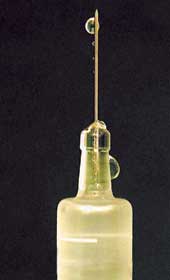 |
It’s called sodium pentothal. Used traditionally in operating theatres across the world, an adequate dose of the barbiturate helps induce general anaesthesia before surgery and is so potent that it takes less than a minute to bring about the onset of unconsciousness in a person. When administered in a lower dose, however, the drug doesn’t knock one off, but nevertheless generates a state of stupor. It’s a trance-like phase, experts say, where a person’s inhibitions are lowered to the extent of making him spill facts that would otherwise have been suppressed by his conscious self. That’s when medical science gives way to forensics.
A few months ago, Indian television audiences watched with bated breath as Abu Karim Telgi, the main accused in the stamp paper scam, was shown telling all to investigators under the effect of the truth serum during a narco-analysis test. Then, a couple of weeks ago, the master-servant duo accused in the Nithari killings was subjected to the same analysis — they also underwent another test called brain mapping — by Noida police personnel.
The results of these tests were not, by any means, admissible in courts as evidence — experts say they can’t even be referred to in a court of law. Nonetheless, they were conducted to aid investigators in cracking the cases. Jayanta Narayan Chatterjee, advocate, Calcutta High Court, explains why. “If a person accused of murder reveals during such a test that he has hidden his weapon in a particular place, it may help the police in tracking down the weapon. While the court may not recognise the test, it may consider the weapon, if found, as evidence,” he says.
Some regard tests such as narco-analysis and brain mapping as better alternatives to older processes such as the polygraph, commonly known as the lie detector. While the polygraph was used on people in full control of their consciousness, narco-analysis and brain mapping are tests targeted at the subconscious human mind and impulses in the human brain, respectively. “During narco-analysis, the conscious mind is rendered ineffective, so as to enable a person to express his true feelings,” says R.K. Sharma, additional professor of forensic medicine, All India Institute of Medical Sciences (AIIMS), Delhi. “Brain mapping, on the other hand, works on the principle of providing a person with external stimuli such as pictures or sound clips and then scanning the brain for corresponding responses.”
In the Nithari case, for example, the accused were shown pictures of the missing children during brain mapping. “If the accused had seen the children before, their brains would respond to those pictures with familiarity, and those impulses would be recorded by the receptors,” says Sharma.
Technically, it all sounds fine. But questions still abound about the dependability of these processes. Sharma stops short of dubbing them foolproof. “Hardened criminals may not respond to narco-analysis as easily as first-time offenders,” he says. “A person with a criminal bent of mind may remain silent even under the effect of the truth serum.”
A highly placed official in the Calcutta Police seconds Sharma’s views. “Since it (narco-analysis) is not an established method of investigation, I cannot comment on whether or not it is effective,” he says, on condition of anonymity.
“For all we know, a person may begin to hallucinate under the effect of the drug and tell the police something which is far removed from the truth,” holds Supreme Court lawyer Vrinda Grover. “Critically speaking, narco-tests are only a more refined way of getting people to confess than older confession techniques such as third degree torture. And either way, we are left with an inefficient investigative agency that can’t follow up a case on its own abilities and has to depend on what the accused tell it.”
Another aspect of these tests which has drawn flak is their self-incriminating nature, which comes in direct conflict with the constitutional right of Indian citizens as guaranteed by Article 20 of the Indian Constitution. “No person accused of any offence shall be compelled to be a witness against himself,” says the Indian Constitution.
In that light, it technically becomes mandatory for investigative authorities to obtain the written permission of an accused before conducting such tests on him or her. This is where several human rights lawyers smell a rat. “Investigators often go ahead with these analyses without the written consent of the accused to undergo such a test,” says Supreme Court advocate and human rights activist Colin Gonsalves. “Furthermore, they have no right to conduct such a test and then leak the results to the media, only to mislead the public about the investigative process.”
There is legal room for people to challenge these tests, say critics, especially if conducted without consent. Gonsalves is almost certain that legal suits will begin creeping into court rooms in the coming years, as and when investigators begin to rely increasingly on new-age lab tests. But not everyone seems to share Gonsalves’s view. “Whether or not the choices of citizens can be overruled by investigating authorities is something that would finally have to be decided upon by the court of law,” says Supreme Court advocate Nitya Ramakrishnan. “And if the tests can lead to further evidence, there’s no reason why investigators can’t resort to them,” she opines.










